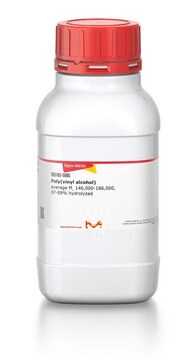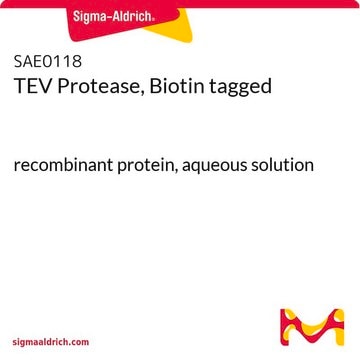추천 제품
생물학적 소스
mouse
Quality Level
결합
unconjugated
항체 형태
ascites fluid
항체 생산 유형
primary antibodies
클론
CTD-19, monoclonal
분자량
antigen 34 kDa
antigen 52 kDa (weaker band)
종 반응성
human
기술
immunohistochemistry (formalin-fixed, paraffin-embedded sections): 1:200 using human breast carcinoma tissue
indirect ELISA: suitable
microarray: suitable
western blot: 1:1,000 using human breast carcinoma cell line extract
동형
IgG2a
UniProt 수납 번호
배송 상태
dry ice
저장 온도
−20°C
타겟 번역 후 변형
unmodified
유전자 정보
human ... CTSD(1509)
일반 설명
Cathepsins are lysosomal proteases that play an important role in the intracellular degradation of exogenous and endogenous proteins, in activation of enzyme precursors, and in tumor invasion and metastasis. They are normally localized in lysosomes of almost all mammalian cells, but under certain conditions they can be secreted from the cells.
Cathepsin D (CD, EC 3.4.23.5), an aspartyl endopeptidase, is induced by estrogen in certain estrogen receptor (ER)-positive breast cancer cell lines, but is produced constitutively by ER-negative cell lines. Cathepsin D is synthesized as a 52 kDa inactive precursor (pro-cathepsin D). Proteolytic removal of the amino-terminal 43 amino acid fragment and cleavage at an internal site results in an enzymatically active 48 kDa heterodimer consisting of two chains of 14 and 34 kDa.
The level of CD synthesized by cells is increased in response to mitogenic signals from estrogen, EGF, FGF, and IGF- I. The ability of tumor cells to invade the extracellular matrix has been attributed to cathepsins released by tumor cells or associated with the plasma membrane of tumor cells. CD is capable of digesting extracellular matrix proteins in in vivo models. Transfection of the CD gene into rat cells increases their tumorigenicity when injected into nude mice. Indeed, the concentrations of CD are significantly higher in breast carcinomas than in either normal breast tissues or benign breast tumors.
Cathepsin D (CD, EC 3.4.23.5), an aspartyl endopeptidase, is induced by estrogen in certain estrogen receptor (ER)-positive breast cancer cell lines, but is produced constitutively by ER-negative cell lines. Cathepsin D is synthesized as a 52 kDa inactive precursor (pro-cathepsin D). Proteolytic removal of the amino-terminal 43 amino acid fragment and cleavage at an internal site results in an enzymatically active 48 kDa heterodimer consisting of two chains of 14 and 34 kDa.
The level of CD synthesized by cells is increased in response to mitogenic signals from estrogen, EGF, FGF, and IGF- I. The ability of tumor cells to invade the extracellular matrix has been attributed to cathepsins released by tumor cells or associated with the plasma membrane of tumor cells. CD is capable of digesting extracellular matrix proteins in in vivo models. Transfection of the CD gene into rat cells increases their tumorigenicity when injected into nude mice. Indeed, the concentrations of CD are significantly higher in breast carcinomas than in either normal breast tissues or benign breast tumors.
특이성
Monoclonal Anti-Cathepsin D reacts specifically with cathepsin D (34 kDa with a weaker band at 52 kDa) in immunoblotting. It is also reactive in ELISA and in immunohistochemical staining of formalin-fixed paraffin-embedded human tissue sections. The product does not react with bovine cathepsins D and B, nor with human cathepsins B, C, G, and H.
면역원
human liver cathepsin D.
애플리케이션
Applications in which this antibody has been used successfully, and the associated peer-reviewed papers, are given below.
Immunohistochemistry (1 paper)
Western Blotting (1 paper)
Immunohistochemistry (1 paper)
Western Blotting (1 paper)
Monoclonal Anti-Cathepsin D may be used for the localization of cathepsin D using various immunochemical assays such as ELISA, immunoblotting, and immunohistochemistry. Antibodies that react specifically with cathepsin D may be used to study the distribution of CD in human breast cancers and to relate its concentrations to various biochemical, histological, and clinical characteristics.
면책조항
Unless otherwise stated in our catalog or other company documentation accompanying the product(s), our products are intended for research use only and are not to be used for any other purpose, which includes but is not limited to, unauthorized commercial uses, in vitro diagnostic uses, ex vivo or in vivo therapeutic uses or any type of consumption or application to humans or animals.
적합한 제품을 찾을 수 없으신가요?
당사의 제품 선택기 도구.을(를) 시도해 보세요.
Storage Class Code
10 - Combustible liquids
WGK
WGK 3
Maria Qatato et al.
Frontiers in pharmacology, 9, 221-221 (2018-04-05)
Trace amine-associated receptor 1 (Taar1) has been suggested as putative receptor of thyronamines. These are aminergic messengers with potential metabolic and neurological effects countering their contingent precursors, the thyroid hormones (THs). Recently, we found Taar1 to be localized at the
Hsin-Yao Tang et al.
Journal of proteome research, 10(9), 4005-4017 (2011-07-06)
Stable isotope dilution-multiple reaction monitoring-mass spectrometry (SID-MRM-MS) has emerged as a promising platform for verification of serological candidate biomarkers. However, cost and time needed to synthesize and evaluate stable isotope peptides, optimize spike-in assays, and generate standard curves quickly becomes
Arezoo Daryadel et al.
The Journal of biological chemistry, 281(37), 27653-27661 (2006-07-25)
Macrophage migration inhibitory factor (MIF) is an important cytokine involved in the regulation of innate immunity and present at increased levels during inflammatory responses. Here we demonstrate that mature blood and tissue neutrophils constitutively express MIF as a cytosolic protein
Kriti Singh et al.
Breast cancer research : BCR, 17, 27-27 (2015-04-08)
Current approaches to inhibit oestrogen receptor-alpha (ERα) are focused on targeting its hormone-binding pocket and have limitations. Thus, we propose that inhibitors that bind to a coactivator-binding pocket on ERα, called activation function 2 (AF2), might overcome some of these
Federica Mastroiacovo et al.
Molecules (Basel, Switzerland), 27(10) (2022-05-29)
The brain area which surrounds the frankly ischemic region is named the area penumbra. In this area, most cells are spared although their oxidative metabolism is impaired. area penumbra is routinely detected by immunostaining of a molecule named Heat Shock
자사의 과학자팀은 생명 과학, 재료 과학, 화학 합성, 크로마토그래피, 분석 및 기타 많은 영역을 포함한 모든 과학 분야에 경험이 있습니다..
고객지원팀으로 연락바랍니다.








